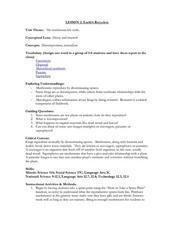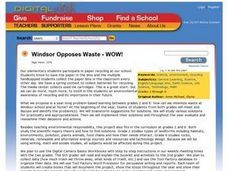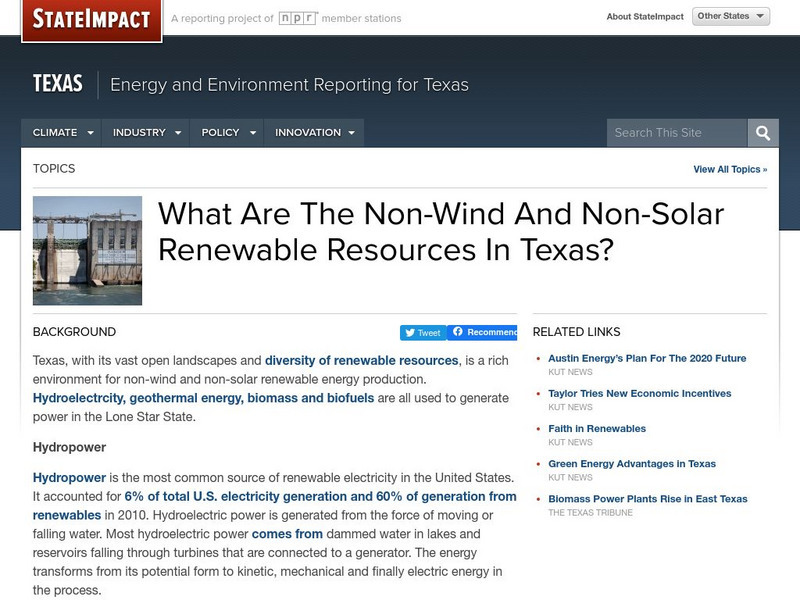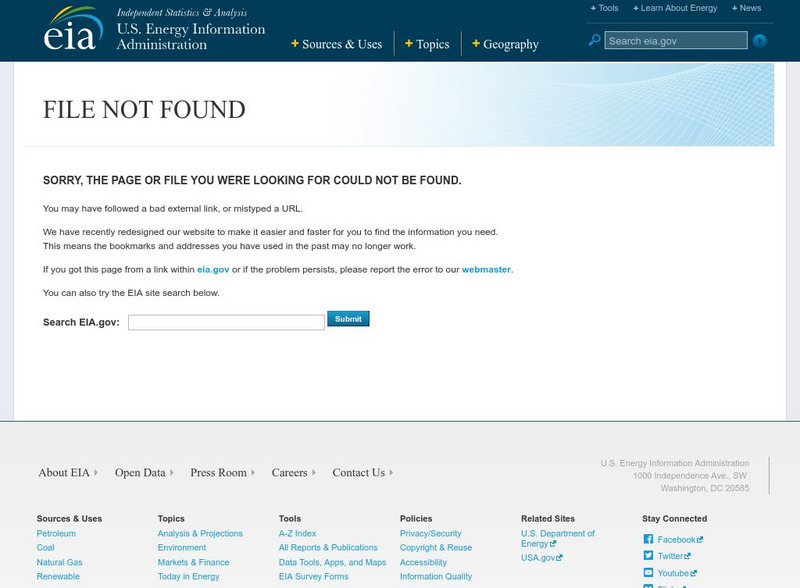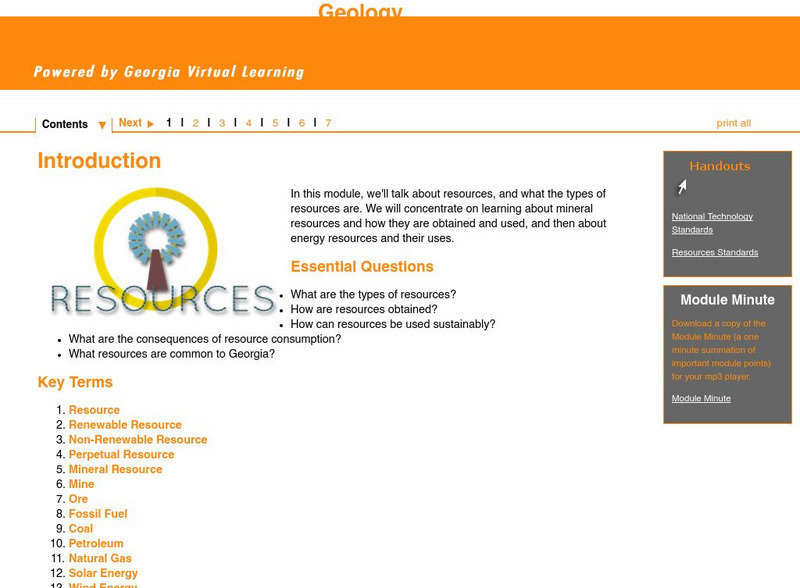Curated OER
Natural Hazards
Learners evaluate the hazards of naturally occurring events. After watching a video concerning safety hazards, students work in groups to discuss the safety issues involved in taking a trip to a mountainous region. Recommendations are...
Curated OER
Watershed Delineation
Students use topographic maps to delineate a watershed.In this ecology lesson, students draw the boundaries of a watershed onto a map using contour lines as a guide. Their resulting maps are used to evaluate their understanding.
Curated OER
Transportation Choices and the Environment
Middle schoolers study statistics and charts pertaining to how transportation and other energy choices impact the environment. They participate in small group discussions regarding concerns for the future.
Curated OER
Earth's Recyclers
Students work together in groups to report on different topics related to decomposition. They answer questions and share their answers with the class. They discuss any topic that is unclear.
Curated OER
On the Surface
Students draw and label the 15 major rivers in Texas. They then draw and label another map with the major lakes and reservioirs of Texas. Students use the maps and locate and label the location of the following major Texas cities:...
Curated OER
Chicago Questionnaire
Students critically investigate the issues surrounding the dropping of atomic bombs on Japan. They conclude if dropping the bombs was a correct decision or not and support their conclusions with documentation. Students tie in atomic...
Curated OER
Windsor Opposes Waste - WOW!
Students participate in paper recycling. They are taught to environmental awareness of recycling and its importance in their future. Students discuss and identify the problems of how they can minimize waste. They brainstorm suggestions...
Curated OER
Mississippi’s Electricity: From Generation to Consumption
Eighth graders discover how electricity is produced. In this physics activity, 8th graders infer about the future of Mississippi's energy industry. They participate in a Smart Board interactive activity at the end of the activity.
Curated OER
Alternative Energy
Students identify the five major alternative energy sources. In this physical science lesson, students assess the advantages and disadvantages for each type of energy. They complete a concept map using information they researched.
CK-12 Foundation
Ck 12: Life Science: 12.29 Renewable Resources
Learn how some renewable resources contribute to alternative energy sources.
US Geological Survey
Non Renewable Resources
Learn how to enhance economic development and growth. Learn the role of the United States Geographic Survey on locating, quantifying and qualifying non-renewable resources.
Other
Peak Oil: Non Renewable Resources Depletion Effects
A collection of graphs, tables, and diagrams that illustrate the global impact of natural resource depletion. (Published 2014)
CK-12 Foundation
Ck 12: Renewable Versus Non Renewable Resources
[Free Registration/Login may be required to access all resource tools.] Discusses the differences between renewable and nonrenewable natural resources. Includes study and review questions, and links to additional resources.
NC State University
Ncsu: What Will Be Left of Earth's Non Renewable Resources?
An interactive graph that predicts how many years until more than two dozen natural resources (e.g., chromium, oil, tin, coal, etc.) are depleted, based on current production rates or production that grows each year. Use the slider at...
Other
Florida Dept. Of Education: Conservation of Renewable and Nonrenewable Resources
In this learning module, students learn to differentiate between renewable and nonrenewable resources, and identify resources that fit into each category. It explains the environmental effects of using nonrenewable resources, such as...
Other
Renewable Resource Data Center (R Re Dc)
This site provides information on renewable energy, including biomass resources, geothermal resources, solar resources, and wind resources.
TeachEngineering
Teach Engineering: Renew a Bead
A quantitative illustration of how non-renewable resources are depleted while renewable resources continue to provide energy. The activity requires students to remove beads (units of energy) from a bag (representing a country). A certain...
CK-12 Foundation
Ck 12: Earth Science: Renewable Versus Non Renewable Resources
[Free Registration/Login may be required to access all resource tools.] Distinguishes between renewable and nonrenewable resources.
NPR: National Public Radio
Npr: What Are the Non Wind and Non Solar Renewable Resources in Texas?
An overview of renewable energy resources in Texas, aside from wind and solar energy. Covers hydropower, geothermal energy, and biomass.
US Energy Information Administration
U.s. Eia Energy Kids: Energy Sources: Renewable
Find out what renewable energy is and the role it plays in meeting energy needs. Renewable energy sources include biomass, hydropower, geothermal, wind, and solar.
US Energy Information Administration
U.s. Eia Energy Kids: Energy Sources: Renewable
Learn about renewable energy sources including biomass, which includes biofuels, hydropower, geothermal, wind, and solar.
eSchool Today
E School Today: Your Cool Basics on Natural Resources
Looks at the two categories of natural resources, what they are used for, their distribution around the world, threats to natural resources, recycling and composting, and conservation.
Georgia Department of Education
Ga Virtual Learning: Geology Resources
In this interactive tutorial you will learn about geological resources. Learn what the types of resources are and concentrate on learning about mineral resources and how they are obtained and used, and then about energy resources and...
Scholastic
Scholastic: Study Jams! Science: Energy, Light and Sound: Renewable Fuels
A slideshow and a short quiz on the different types of renewable energy sources.
Other popular searches
- Non Renewable Resources
- Non Renewable Resources
- Science Renewable Resources
- Grade 7 Renewable Resources
- Renewable Resources Wood
- Cookies Renewable Resources
- Renewable Resources Lab
- Ecology Renewable Resources
- Renewable Resources Lessons
- Renewable Resources Worksheets





